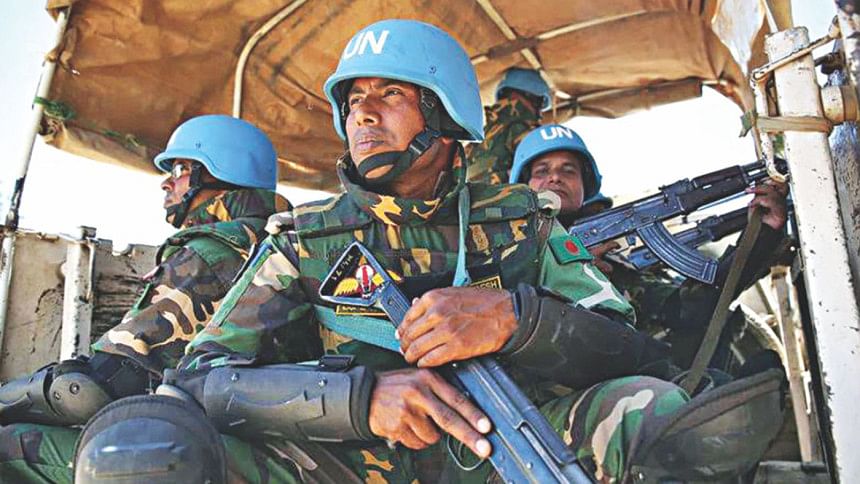Bangladesh in peacekeeping: 30 years of service and sacrifice

The first United Nations (UN) peacekeepers were deployed in the Middle East on May 29, 1948 and since then, more than a million peacekeepers have been deployed in 71 missions across the globe to guarantee peace to billions of people. Though a late entry in 1988, through the United Nations Iran-Iraq Military Observer Group (UNIIMOG), Bangladesh has deployed more than 0.15 million of its peacekeepers in 54 missions spread across 40 different countries. In discharging their solemn duties under the UN flag, a total of 139 Bangladeshi peacekeepers have made the ultimate sacrifice among a total of 3,700 UN peacekeepers killed in peacekeeping duty. The theme of the International Day of UN Peacekeepers 2018 has rightly been chosen as, "UN Peacekeepers: 70 Years of Service and Sacrifice". Likewise, Bangladesh is also celebrating her 30 years of service and sacrifice in UN peacekeeping role.
Looking back on the seven decades of service and sacrifice by the UN peacekeepers, it is observed that a huge transformation has occurred in UN peacekeeping, i.e. from the traditional peacekeeping to a complex and multidimensional peace enforcement extending to peace building. When the UN Charter was formed in 1945, it did not include any explicit provision of UN peacekeeping which emerged subsequently. Some argue that UN peacekeeping is an improvisational outcome of the Cold War and decolonisation. However, in the process, the elements of UN Charter's Chapters VI, VII and VIII have been inducted in the peacekeeping operations. UN peacekeeping operations (UNPKO) have earned due credibility and is widely recognised as a universal feature of multilateral crisis management. In the last 70 years of UNPKO, it had its ups and downs for which they are usually praised but also maligned sometimes. Though there are missions mired in prolonged stalemate like Middle East and Cyprus, there are also successes that brought smiles to millions of people in Liberia, Mozambique, Cambodia, Sierra Leone, Namibia, Timor-Leste, etc.
To make it a global partnership, the UN has been able to mobilise more than 120 member-states to provide troops to the missions though all contribute financially. Because of its involvement, commitment, partnership and services provided, UNPKO is the frontrunner of all UN activities and the most important one. However, UN being a deeply political organisation, the national/group interests at times affect the selection process, autonomy, and transparency of various missions. For example, the situation in the Middle East, especially in Palestine, warrants a large and robust peace enforcement force instead of the existing dormant mission (UNTSO). In spite of its cost effectiveness (incurring only 0.5 percent of the global military spending), UN finds it difficult to mobilise adequate funds for various missions that affect its mandates and resources.
Our peacekeepers have played a key role in UNPKO successes. Bangladesh joined the second generation of UN peacekeeping and has coped with its growing transformation with its professional élan. Bangladesh Army took the pioneering role and subsequently the sister services, i.e. Bangladesh Navy (BN) and Bangladesh Air Force (BAF) as well as Bangladesh Police, reinforced the peacekeeping forces. Over the last three decades, these forces have developed an efficient standing operating procedures (SOPs), established institutional framework to mobilise for peacekeeping operations, and are in a position to train and deploy effective and adequate forces when the UN calls for it. Since its induction to UNPKO in 1988, the number of Bangladesh forces have kept on increasing. Bangladesh became a top troop-contributing country (TCC) by early 2000, which has been maintained till date. This is a clear manifestation of Bangladesh peacekeepers' impartial commitment, professionalism, dedication and adaptability. The deployments had been in the far-flung areas stretching from Cambodia, Haiti, Congo, West Africa, Sudan, Middle East and Bosnia and Herzegovina, etc. However, most of the deployments were, and are, in Africa.
Bangladesh's quick rise in the UN peacekeeping role is often discussed in the international media and academic circle. Bangladesh's consistent participation originates from her constitutional obligations to maintain peace, freedom and justice across the world. It also stems from her sacrifice in the War of Liberation 1971. Hence, there is a strong political and national will to participate in peacekeeping. A question that is often raised is: "Is Bangladesh's leading troops contribution status proportionately represented in the policy making and leadership role in the UN Department of Peacekeeping Operations?" The answer is clearly negative. Therefore, it demands a forceful diplomatic manoeuvre to ensure proportionate representation and the said provision is also stated in UN Charter and various resolutions passed later.
It is believed that the UN peace operations will continue in the years to come as conflicts are continuing across the world. However, the nature of the conflicts and the evolving strategic scenario are likely to create new dimensions and more demand for robust peacekeeping operations. Moreover, in the process of increasing global partnership and regional influence, the large contribution of forces by Bangladesh may face challenges. Hence, Bangladesh needs to remain focused to meet these challenges. These can be met with quality representations, i.e. high professionalism and competency over other TCCs. Thus, it is imperative to have an integrated approach for all of its forces with a clear National Policy and this has already been raised by a few scholars. This policy can also be an extension of the foreign policy to enhance national interests in the countries where peace has been restored with the help of our forces.
Bangladesh also needs a dedicated centre to study and research on the strategic issues of global peacekeeping and advise the stakeholders concerned on appropriate responses. It is to be noted that Bangladesh Institute of Peace Support Operation Training (BIPSOT) primarily provides excellent training on tactical and operational issues of peacekeeping. Bangladesh Institute of International and Strategic Studies (BIISS) occasionally organises seminars on UN peacekeeping operations which are considered inadequate to formalise any policy. Bangladesh Peacebuilding Centre (BPC), formed in 2016, has yet to deliver its full potentials. As regards peacekeeping and peacebuilding studies and training, the roles of these institutes/think tanks should be well-defined and properly demarcated to avoid duplicity of efforts.
Through these institutes, Bangladesh should engage academics to carry out research on UNPKO and, in particular, Bangladesh's roles. The participating forces should also preserve records and maintain archives of all activities of various contingents and observers. In essence, it can be argued that Bangladesh is well-poised to continue her contributions to UNPKO.
>hr>
Brigadier General Ilyas Iftekhar Rasul, ndc, psc (retd) is a former defence adviser to Bangladesh Permanent Mission to UN, New York.





Comments